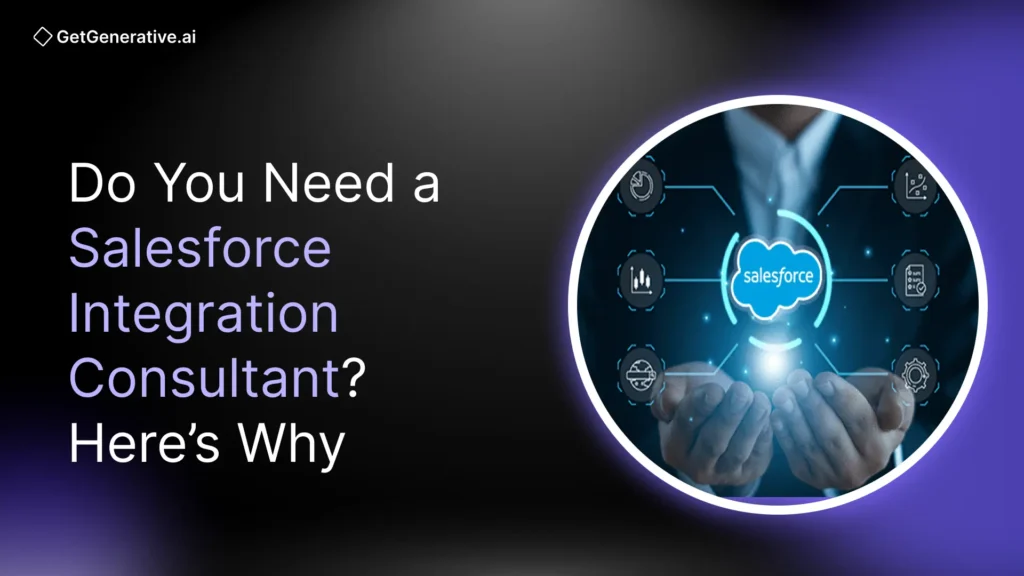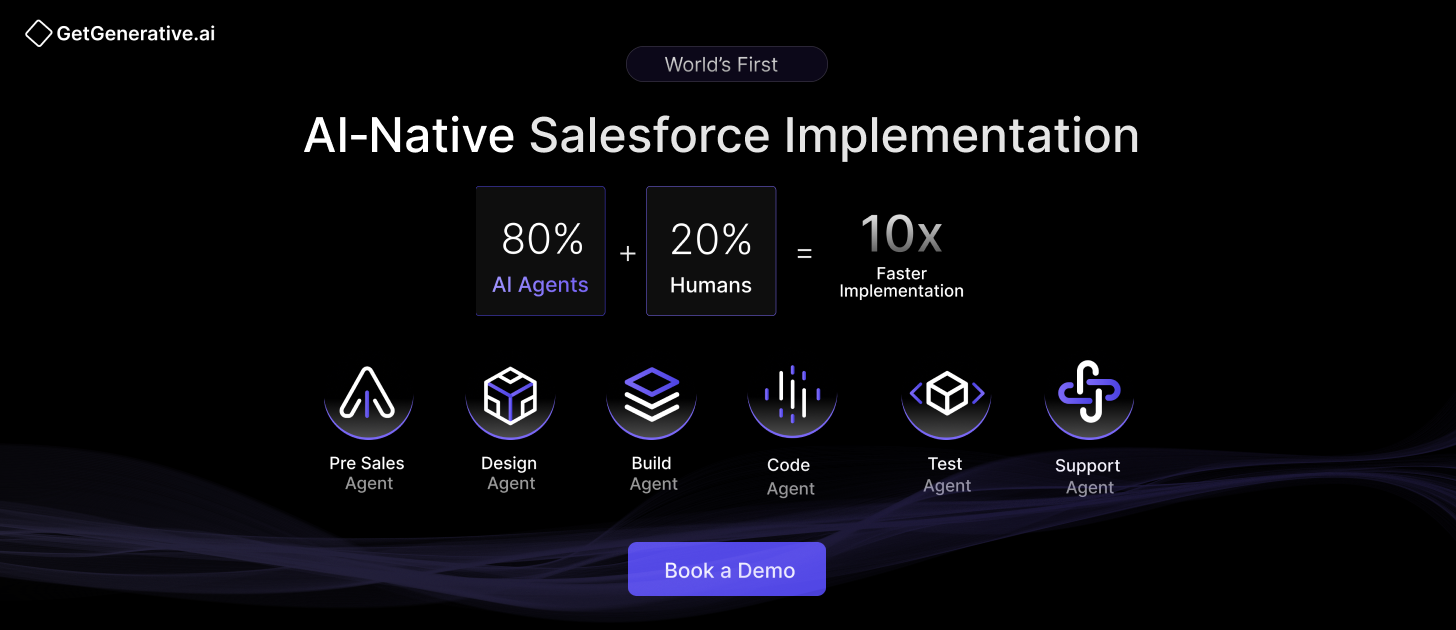Do You Need a Salesforce Integration Consultant? Here’s Why
When does your organization truly need a Salesforce integration consultant, and what is the cost of getting it wrong?
With Salesforce holding 20.7% of the global CRM market and processing over 7.6 billion integration transactions daily, it has become the digital backbone of enterprises worldwide. Yet, despite its dominance, industry research highlights a sobering reality: 50–90% of CRM projects fail to meet objectives, often due to preventable integration challenges .
This gap between Salesforce’s potential and real-world outcomes has fueled the rapid growth of the consulting ecosystem. Valued at $20.93 billion in 2025, the Salesforce consulting services market is projected to reach $57 billion by 2032, reflecting a remarkable 15.4% CAGR. For executives, the choice to engage an integration consultant is far more than vendor selection—it’s a strategic investment that can mean the difference between achieving 299% ROI over three years or falling into the 90% of underperforming projects.
The Current State of Salesforce Integration Complexity
Market Dynamics Driving Integration Demands
Enterprises today rely on an average of 1,000 separate applications, yet only 28% are properly integrated. This creates “data silos”—isolated pockets of critical information that prevent organizations from delivering on Salesforce’s promise of a unified customer view.
According to industry research, 81% of IT leaders cite data silos as the primary roadblock to digital transformation . For Salesforce customers, this becomes especially challenging when integrating with ERP systems, marketing platforms, and legacy databases not designed for modern API connectivity.
Consider a manufacturing enterprise: Salesforce must connect with SAP for financials, Oracle for inventory, HubSpot for marketing, and custom scheduling apps. Each integration introduces risks—latency issues, error handling, maintenance, and security overhead—that scale exponentially with system complexity.
The Hidden Costs of Poor Integration
Executives often focus on visible consultant fees—typically $100–300 per hour or $10,000–200,000 for projects—but the hidden costs of failed integrations are far higher. Research shows that poor data quality alone costs companies $12.9 million annually, while failed Salesforce rollouts result in $2,500 per employee per year in lost productivity.
The ripple effects are significant:
- Sales reps waste 70% of their time on non-selling activities due to fragmented systems.
- Marketing campaigns fail without clean, synchronized customer data.
- Executives receive inaccurate forecasts from dashboards corrupted by broken integrations.
These inefficiencies accumulate quarter after quarter, dwarfing the initial investment required for expert consulting.
Recognizing the Signs: When You Need Expert Help
Operational Red Flags
Senior leaders should recognize key warning signs that signal the need for integration consulting:
- System performance issues: Latency, synchronization delays, or recurring integration failures.
- User adoption decline: If Salesforce usage stagnates while teams fall back on spreadsheets, it’s often due to missing or inconsistent integration data.
- Data integrity breakdowns: Duplicate records, mismatched financials between Salesforce and ERP, or campaigns misfiring because of stale datasets.
These issues usually indicate that your integration approach cannot handle enterprise-level data volume or complexity.
Strategic Growth Triggers
Beyond red flags, certain growth scenarios demand integration expertise:
- Mergers & acquisitions: Consolidating disparate systems quickly is critical to realizing deal value.
- Digital transformation: Migrating from legacy systems to the cloud requires airtight integration to maintain continuity.
- Compliance-heavy industries: Healthcare, financial services, and manufacturing require integrations that preserve audit trails, data lineage, and strict security protocols .
In each case, expert consultants provide the frameworks and execution needed to avoid costly disruption.
Also Read – Salesforce Integration Consultant: A Complete Guide
The Strategic Value Proposition of Integration Consultants
Faster Implementation, Faster Value
Industry studies show that organizations using experienced integration consultants achieve 78% faster project delivery compared to internal teams. Why? Consultants bring:
- Pre-built integration frameworks.
- Proven best practices.
- Knowledge of recurring integration patterns.
While internal teams may take 12–18 months to build integrations, consultants can often deliver in 4–6 months, unlocking business value much sooner.
Risk Mitigation & Quality Assurance
Equally important is risk management. Consultants anticipate pitfalls such as Salesforce governor limits, API versioning issues, and scalability challenges. They also enforce rigorous quality assurance through:
- Comprehensive testing frameworks.
- Data validation and rollback processes.
- Business continuity safeguards.
This structured risk management greatly reduces the chance of post-implementation failures.
Advanced Technical Capabilities
Modern Salesforce integrations often demand capabilities beyond typical IT teams:
- AI-driven integration design: Using machine learning to optimize data flows.
- Event-driven architectures: Enabling real-time synchronization across multiple systems.
- API governance: Ensuring lifecycle management, performance monitoring, and secure operations at scale.
These are precisely the areas where seasoned consultants deliver transformative impact.
Financial Analysis: The True Cost-Benefit Equation
Looking Beyond Hourly Rates
While consulting fees average $100–300 per hour or $10,000–200,000 per project, executives must look at the total cost of ownership (TCO):
- Opportunity cost of internal teams: IT staff spending months on integration means fewer resources for other strategic initiatives.
- Infrastructure/tooling costs: Consultants bring pre-built testing and monitoring frameworks, saving licensing and setup expenses.
- Training costs: Instead of enrolling staff in costly training, organizations gain immediate expertise and structured knowledge transfer.
When viewed through this lens, external consultants often deliver better financial efficiency than internal-only approaches.
ROI Realization Patterns
Data from successful Salesforce projects shows organizations achieve 299% ROI over three years, with payback in as little as 12–13 months . ROI drivers include:
- Operational efficiency: Automated data syncs eliminate manual reconciliation.
- Sales productivity: Unified customer views boost lead management and forecasting accuracy.
- Customer experience: Real-time access across touchpoints enhances personalization.
- Failure cost avoidance: Avoiding $ millions in remediation costs from botched integrations.
- Revenue acceleration: Companies report 21–30% improvements in sales effectiveness after successful Salesforce integrations.
Also Read – Tableau and Salesforce Integration: A Complete Guide
Building the Business Case: Decision Framework for Executives
Complexity Assessment Matrix
To decide whether to engage a consultant, assess integration needs on three dimensions:
- Technical complexity – number of systems, real-time data needs, transaction volume, and required custom logic.
- Organizational complexity – distributed teams, change management needs, user adoption dependencies, and aggressive timelines.
- Risk tolerance – industries with strict compliance (finance, healthcare), limited IT resources, or high competitive stakes should lean toward consultant involvement.
Build vs. Buy vs. Partner
- Build: Internal development works if requirements are simple and timelines are flexible.
- Buy: Pre-built integrations fit standard use cases but often lack customization.
- Partner: Consultants deliver the best balance of customization, speed, and risk management, especially in high-stakes, multi-system environments.
For most enterprises, the partner model is optimal.
Implementation Strategies: Maximizing Consultant Value
Choosing the Right Engagement Model
Executives should align consultant engagement with business priorities:
- Fixed-scope projects: Best for stable requirements and predictable deliverables.
- Time-and-materials: Flexible for evolving projects, but require strict oversight to prevent overruns.
- Retainer models: Provide ongoing access to expertise for continuous optimization, typically at $90–300/hour depending on experience and region.
Governance & Success Metrics
Clear governance ensures that consultant success translates into business value. Key elements include:
- KPIs: System uptime, data accuracy, user adoption, and efficiency gains.
- Governance cadence: Weekly reviews, milestone-based deliverables, and structured communication.
- Knowledge transfer: Documentation, staff training, and phased ownership transition ensure sustainability.
Also Read – Salesforce OmniStudio Integration Procedures Explained
Future-Proofing Integration Investments
Preparing for Emerging Technologies
The integration landscape is rapidly evolving. Consultants help organizations prepare for:
- AI-powered automation – optimizing workflows through intelligent orchestration.
- Event-driven architectures – enabling real-time responses to data changes.
- Composable applications – flexible, modular systems designed for rapid adaptation.
- Low-code/no-code platforms – empowering citizen developers but requiring architectural oversight to avoid scalability issues.
Expert consultants ensure integrations aren’t just built for today, but also for tomorrow’s technology shifts.
Organizational Readiness & Change Management
Integration success depends on people as much as technology. Consultants often guide:
- User adoption strategies – workflows, training, and ongoing support.
- Cultural transformation – moving from siloed to collaborative, data-driven decision-making.
- Compliance alignment – ensuring security, data lineage, and auditability across all connected systems.
Conclusion
The stakes for Salesforce integrations are higher than ever. While internal teams may be able to handle basic connections, complex, high-value enterprise initiatives demand the expertise of seasoned integration consultants. The risks of failure—lost productivity, compliance penalties, and failed digital transformation—far outweigh consultant fees.
At GetGenerative.ai, we’ve reimagined Salesforce implementation—built from the ground up with AI at the core. This isn’t legacy delivery with AI added on. It’s a faster, smarter, AI-native approach powered by our proprietary platform.
👉 Explore our Salesforce AI consulting services




